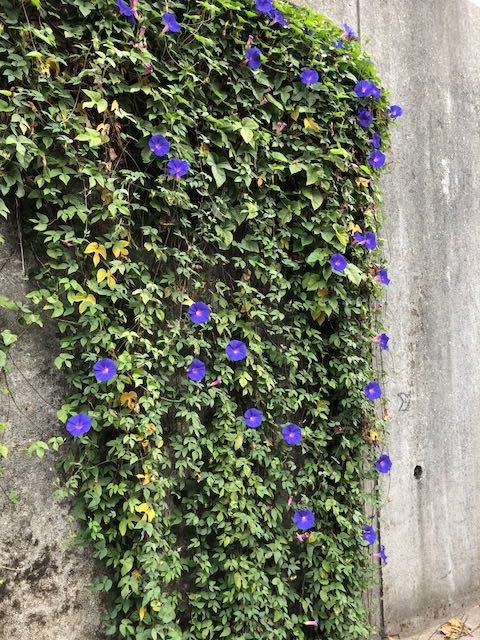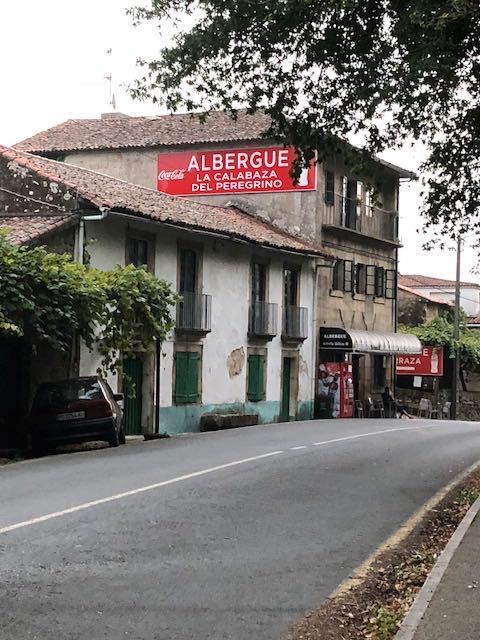Friday, September 28. From Padron, it’s an easy walk out with the usual mist and fog, and as usual, it will be cool until the fog disappears. Then the sun will blast bright and beautiful, but hard on an oldish walker. The path leads through and then around the main part of town, and as I head right and then up, I am delighted to see a beautiful graveyard, similar to some of the ones in Italy.
 Leaving Padron, walking through and around villages like Santa Maria de Adina, Romeris, Vilar. Again, very few places to stay, according to Brierley, at least after the first 8 km. (too soon to stop for the day), but my e-book maps show a little tiny village (tinier than most of the tiny villages I will pass today, called Faramello, in which there is an Albergue La Calabaza del Peregrino. I had called last night to reserve two beds for Ria and me. So at least I know where I am headed. This is approximately the halfway point between Padron and Santiago.
Leaving Padron, walking through and around villages like Santa Maria de Adina, Romeris, Vilar. Again, very few places to stay, according to Brierley, at least after the first 8 km. (too soon to stop for the day), but my e-book maps show a little tiny village (tinier than most of the tiny villages I will pass today, called Faramello, in which there is an Albergue La Calabaza del Peregrino. I had called last night to reserve two beds for Ria and me. So at least I know where I am headed. This is approximately the halfway point between Padron and Santiago.
No cows yet, and no more horses, but I do see this poor thing, tied up to a post on a village street corner, his right front leg corralled by the rope:
Fortunately, I notice three old women (I should talk . . . ) a few feet from the animal, and I gesture toward the sheep’s leg, help untwist him, and he is happier. I continue through the hill and villages toward Faramello.
At one point, I find myself on a crushed gravel path, not sure whether I have missed an arrow. Ahead of me is a couple, and I think, “Well, I’m on the right road,” but then they stop, he turns round with his phone in his hand for directional help, and waves at me. Hands in the air in a question, I reply with the same, and shake my head. Together, we guess that we’ve indeed missed a turn.
I don’t remember exactly what he says, but I do recognize the language. “Italiano?” I ask. He nods. “Parle Italiano?” he queries. “Ah, poco,” I respond. But we begin a bit of a conversation as he, his wife, and I head back down toward the village searching for another arrow. I ask him (in Italian, I might add) whether he and his wife have a reservation for tonight. No, he doesn’t. Where am I staying? I tell him, show him, give him the phone #, and he calls on the spot to secure two places for himself and his wife. He nods gratefully, “Grazie!”
We do find the slightly hidden arrow, and begin again to walk in the correct direction. I take my time, but see them up ahead, and we converge on a bigger group of pilgrims as we approach Santa Maria de Cruces. Everyone looks for a bar. A woman outside the first bar directs people to a restaurant across the road, and the collection of bodies shifts to the left and toward the recommended food source.
Trying to tell the waitress that I would like just two or three slices of ham and cheese, but no bocadillo, she goes back into the kitchen for awhile and returns with three HUGE plates of sliced ham and cheese. No way can I eat all of that, so I take it all back in and try to talk with the bartender. He haltingly explains that he doesn’t serve only two or three slices of anything. He takes one plate piled with cheese, and shoves the rest toward me again, I sigh and return to my table again, with my new Italian friends, Ricardo and Paula. I offer them part of my heaping plates, but they have ordered Padron peppers, huge salads and a big sandwich. And two beers. No room for my unwanted food.
Ricardo and I try to communicate in our meager English and Italian, respectively. Good practice for each of us, but useless if we really want to convey information. So we finally resort to technology. We each have Google Translate, so he talks into his phone, and turns the translation toward me. I then talk into MY Google Translate and turn the phone toward him. In this way, we can have a reasonable conversation.
I finally leave with a plastic ziploc bag full of sliced ham and cheese, wave to Ricardo and Paula, and continue toward Faramello. More hills, more heat, more villages, more bars, where I always order water, no gas, but ice, please.
Finally, after another few hours, my last ice water stop is a larger town called Teo, and a highway out of that town toward the last village for the day, I see a little turnoff to the left, and the slighty farther, another turn to the left, with a handwritten sign: “Faramello” and I can even see the Albergue down the road a bit.
As I enter the front of the La Calabaza del Peregrino, a cheery, but harried woman greets me. “Joannah? From US?” I nod. “Ria, from Germany? She is here.” Well, of course she is! She always gets everywhere before I do. After I pay my 12 Euro for my bed, the woman, Beatrice, leads me upstairs and to my room. A two-bunk room with TWO windows, one looking down on a large grassy patio with a dozen tables and a feisty gathering of pilgrims. Ria’s backpack is already there, and she is resting on her lower bunk. Her hat is on the other lower bed, and she tells me Beatrice has said we might not have any more people in our room tonight, but Ria wants to make sure I have the baja, not the upper bed. I chuckle . . . so considerate of her!
I go down to the patio, with a new glass of ice water, and write for awhile. Ria joins me but at the next table so she can roll her own cigarette, complete with filter, and have a smoke. She does this about six times a day, and is very adept at it. She carries rolling papers, loose tobacco, and a little ziploc bag of white filters, about the size of the end of a Q-tip or smaller, and deftly puts together a nice neat cigarette, I have told her long ago that I wish I had known her when I was a pot smoker. I could never roll a respectable joint.
The restaurant menu has . . . Caldo Gallego, the Galician soup I always crave when I am on a Camino. Cabbage, chicken stock, potatoes (always too many, David L.), white beans. AND they have the first Tarta de Santiago I’ve seen. Yes, I am in Galicia. When I go back into the restaurant to order, Beatrice is even more harried. She is the receptionist for the albergue, AND the cook, AND the waitress, AND the cashier. She puts her hand on mine and says, “Just in a little while, please.” And I assure her I am not in a hurry. Apparently that makes me a friend for life. She hugs me.
Ricardo and Paola arrive and come to sit at a table near me, with another Italian, so no need for Google Translate at this point, at least not for anyone but me. We do have another GT conversation, much to the delight of a very loud crowd at a nearby table. About eight of them, including a boistrous woman, whose voice I could hear from my window, directly above her head. I had done a bit of laundry before I came down to the patio, and had put underwear on the windowsill to dry,
She is talking about “only pilgrims” will do this and that. Points to my laundry and says to her friends, “See? Who would hang a bra out the window anywhere else?” And I cleared my throat and called out, “That is my bra, thank you.” The whole group laughed.
Two or three hours on that patio, watching people come and go, watching Beatrice hustle food out to each table, including mine, and enjoying my first tastes of the Galician soup and the Tarta de Santiago, I argue with myself about whether I’m going to walk to Santiago tomorrow or not, up the very steep climbs and down, up and down. Ria tells me there is a German woman, Gabriella, who has such blisters on her big toes, trying to walk 40 km per day, ignoring her pain for days, who is staying here tonight. She cannot walk any more, especially up the last steep climb to the “finish line”, and she will take the bus in the morning, which stops just three blocks up the road from Faramello.
She is crushed, because she is doing this walk for her 60th birthday, and now feels like she has failed because she can’t “walk in”. I on the other hand, have “walked in” twice in the past five years, and feel no qualms about accompanying her in the morning. Or at least only tiny qualms. Ria introduces us. Gabriella speaks very little English. Ria is surprised because most Germans from cities and surrounding areas DO speak English, though not all as well as Ria does. But then she talks with Gabriella and realizes that G is from Berlin, the part that was East Berlin before the late 80’s, and of course they did NOT learn any English.
She has no place to stay tomorrow, has no idea where to get off the bus at the closest stop to the old city, (where we will still have to “walk in”) and is quite grateful to have a seasoned pilgrim with her. So we make our plan to meet in the morning for a bit of breakfast (toast and tea or coffee), and I go up to my room.
Since it is a Saturday tomorrow, the “last train to Clarkson” leaves in the morning at 9:15 from the bus stop on the main road. We will be there.





👍 It’s all good. Babs
Sent from my iPad
>
Yep, Barbara, it surely is!
How kind of you to help your new German friend when she needed it.
Thank you so much, Woodswomanwrites. And thank you so much for not pointing out that it also was a great excuse for me not to walk those huge hills into Santiago!
Maybe one of your best days. You sound relaxed, relieved. ready to enjoy the last of your pilgrimage.
I’ve enjoyed the vicarious trip with you. Thanks!